A Band By Any Other Name [Liily Review/Interview]
Left to right: Maxx Morando (drums), Sam De La Torre (guitar), Charlie Anastasis (bass), Dylan Nash (vocals).
November 11, 2021
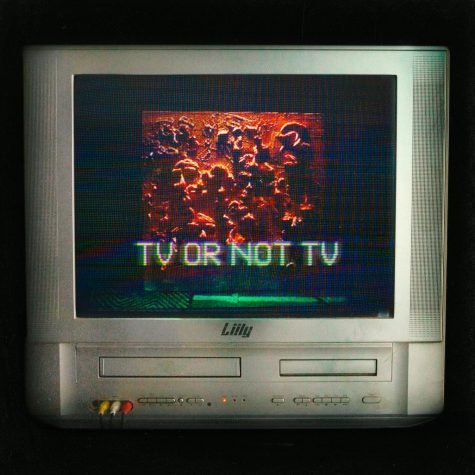
On August 17, 2018, LA rock band Liily released their first single, “Toro.” A little over three years later, they’ve released their debut album.
Actually, let me rephrase that a little. It’s not their first collective release, that title goes to 2019’s I Can Fool Anybody In This Town. While, yes, it is an EP rather than a full album like we have now, it (along with the 2019 single “Wash”), set a very strong foundation for their sound, and served as a great introduction for them.
TV or Not TV, however, is different, seeing the band shift more towards post-punk. In one way, it feels drastically different than their pretty consistent indie-rock sound from their EP, but it’s still distinctly Liily. A left turn, for sure, but maybe not sharp. A slow, calm, and natural left turn that doesn’t have you slamming your head into the window by accident. This album takes a more experimental approach, with many songs being more energetic (“Early Bopper”), being more abrasive (“The Suit That Sold Itself”), incorporating more synths (“The Yig”), or a are a mix of the three (“Odds Are It’s Blue”). Some songs even incorporate some jazz-like elements (“Monkey”).
These differences are immediately evident by the time the first track (“Mr. Speaker Gets The Word”), begins, with a pulsating drum beat, and a matching guitar riff to follow. Just the fact that the drummer (Maxx Morando), doesn’t play for about a quarter of a second between beats already feels very different from Liily’s I Can Fool Anybody In This Town era, considering this is a band that prided themselves in having one of the fastest drummers around, and typically utilized that as much as they could. Sure, it may seem like a very, very minuscule thing to base my opinion on, but I digress.
Over a handful of listens, I’ve started to realize more and more how good of an introduction “Mr. Speaker Gets The Word” is to this album. The aforementioned drum beat, the abrasiveness and jazz influences on display in the form of tritones and stray horns, a droning synth break a couple of times throughout the track, and it very much becomes energetic. This song encapsulates everything new brought to the table with this album, and I love that.
“I Am Who I Think You Think I Am” is the second track from this album and the first single released as promotion, and I honestly couldn’t think of a better pick myself, except maybe “Man Listening To Disc,” considering it was written along with “Wash.” It’s the most similar to what was put out on I Can Fool Anybody In This Town, with all of the TV or Not TV weirdness intact. The chorus explodes into a cacophony of tritones, which, if you haven’t gathered, is kind of a thing in this album. There are a lot of tritones, stray notes, and any other musical thing once considered unholy. Despite this chorus being so chaotic, I think it may be one of the catchiest things I’ve ever heard. I know I have been, (and will continue to be), throwing this word around a lot, but it’s seriously so energetic that it’s burrowed its way into my brain. There have been several times this past week in which I’ve wanted to scream out, “ACCELERATOR, IT! WON’T! LET! ME! BREATHE,” but very much couldn’t do that considering there were other people around me with lives and jobs.
The title track is probably the most fun song on this album. While I wanted to save my comments about the music videos until near the end, I feel like I should at least mention the video for “TV or Not TV” now, because it represents how the song feels perfectly. It’s a little happier than everything else on the album and very, very easy to dance to, but still just a little… off. Lyrically, it’s something I can only interpret as a man spiraling into insanity, and even with how fun the song is, there are still plenty of extra stray woodwind notes to make you feel just a little anxious. The video reflects this. While, yes, Maxx absolutely has very sick moves, do you ever notice how his face is just sort of blank the entire time? He goes to grab a glass from the shelf, and despite leaving the area, his hands stay there. He sits outside of his pool alone only for his body to be duplicated across the porch. He’s a man with a giant house and nothing to lose, yet is plagued by paranoia and hallucinations. That’s how I perceived it, at least. I could be totally wrong, but it represents how the song feels to me pretty well.
“The Suit That Sold Itself” is not only one of the band’s favorite songs from this album, it’s probably the most abrasive song on here. It has two brief spoken-word sections and mainly only comprises of these heavily projected vocals by Dylan Nash along with some drums to back him up. Not to say that those are the only two things featured in the song; sometimes there will be a droning synth backing the track, and, despite not ever being used consistently, guitars are still utilized every few beats and around the chorus otherwise. I wouldn’t say that really matters though, and that brings me to my next point. Over the past week and a half or so of listening to this album repeatedly, I’ve noticed that, while typically the most noticeable and memorable parts of many songs are either the guitar and drums or guitar and vocals, the most noticeable parts of these songs to me seem to be the drums and vocals. Let me try to explain what I mean; “Early Bopper” is probably hands down my favorite song on the album, if not my favorite song by them as a whole so far, and I’ve had it on loop for a couple of months now, as it was one of the singles. Only a few days ago did I realize that I never noticed any guitar or bass in the chorus. I went back to it and realized that, yes, there definitely was guitar, but not used in a way to play riffs, rather to make rhythmic noise, and to make the song louder. The goal in these songs isn’t really to create an earworm for you (even if they can be extremely catchy), it’s trying to send a message to you, and it’s telling you to start jumping around like a maniac.
While we’re on the subject, “Early Bopper” is the best song on the album. I have no doubt about it. Okay, well, I have a little bit of doubt. All of the songs on here are incredible in their own form. I am pretty sure, however. While, yes, it may not exactly be the most creatively outstanding song on the album, it’s the loudest, most energetic, and catchiest song on here. It’s the song I’ve typically been sending to people to get them into the band, and would you believe it works almost every time?
On an album filled to the brim with controlled chaos, “Anvil” stands out. It’s different from every song on the album, an album already different from Liily’s previous work, instead shifting their focus from post-punk to shoegaze. It’s somber, chilling, and even beautiful at times. It has fairly simple writing, but great execution. I’ve seen it described as “bringing out the heaviness in shoegaze,” and I couldn’t describe it any better myself. It’s probably the best, if not the only song on here you can listen to while laying on your bed and zoning out.
I’ve mainly only been pointing out the sonic strengths of TV or Not TV so far, but now I would like to point out some of the album’s lyrical strengths. “The Miracle of Race Wild” is the best example of this as, not only are the lyrics and concept great on their own, but they actually work hand-in-hand with the instrumentation. “The Miracle of Race Wild” portrays Nash’s idea of purgatory; not nothing, but rather everything at once. Rooms of broken trumpets all playing different songs, a dripping faucet that never stops, thumbtacks scattered on the floor, and candles that never light; it’s not immediate torture to its inhabitants, but as this builds up over time, you grow more irritated and numb for eternity, and you finally get what you deserve. Sonically, the song has a very hard time finding a good strike between positive or negative feelings and does something that I can only describe as making you feel like you’re on the edge of being on the edge of being anxious. It’s musical purgatory.
The album comes to a close with “I’m Glad When They Arrive And I’m Glad When They Leave.” It’s this sort of nostalgic slow jam; it can be somber, yes, but it feels refreshing in a way. Like you’re coming to terms with something, it gives you a sense of acceptance, and that you’ve finally learned to move on. So, naturally, it’s a fitting conclusion for the album. Admittedly, I don’t completely understand the story these lyrics are trying to tell; and yet, they’re remarkably touching. It feels close to home. The song sucks you in, and until you know it, it’s over. You’re left only with a slow drum beat, and then silence. As abruptly as the album begins, it ends.
Actually, yeah. I typically have everything I listen to on Spotify set as being in a loop for convenience purposes, and, when listening to “I’m Glad When They Arrive And I’m Glad When They Leave” into “Mr. Speaker Gets The Word,” it flows pretty well. Sure, it’s not continuous, but it’s still on beat. It sounds like Maxx Morando taking a break for a few seconds to wipe the sweat off of his forehead before immediately jumping back into it. Intentional or not, I find that sick.
Before I give my final thoughts on the album, I feel like I would be doing a disservice to myself if I didn’t talk about the music videos released along with it. There were 5 videos released in total, one for every single (“I Am Who I Think You Think I Am,” “Odds Are It’s Blue,” “Early Bopper,” “Anvil”), and the title track, all of which containing some sort of imagery involving TVs except “Odds Are It’s Blue” and “TV or Not TV,” ironically enough. We’ve already touched on the “TV or Not TV” video, so I’m going to continue with the others. All of these videos were directed by guitarist Sam De La Torre. He’s so creative it’s almost sickening. Each video has its own shot of ridiculousness; “I Am Who I Think You Think I Am” shows a woman getting sick, coughing up green goop, and then coughing up a green, fuzzy, stop-motion man that proceeds to terrorize her. “Odds Are It’s Blue” is the weirdest, with a bald Dylan Nash, (and only Dylan), also coughing up goop and painting his body with it as he glitches out in front of a seizure-inducing backdrop. “Anvil” has the most straightforward music video out of the five, with a series of close-up snail footage, occasionally shifting colors, making up for a surprisingly spine-shivering and psychedelic video. Despite “Early Bopper” being my favorite song on the album, I have to admit that the music video is also my favorite, too. It’s fairly simple when you boil it down; Dylan Nash walks out of a bar and down a hall from room to room, only to end up in the same bar at the end of the video. The execution of this, however, is insane. He walks through what is essentially this endless labyrinth, constantly walking into other band members (including himself), and, despite getting his face grabbed and walking through different rooms that should probably never, ever be in the backrooms of a bar, he keeps walking unphased. The editing in this video is so satisfying it makes me want to cry. Cutting from room to room yet never skipping a beat, and may as well be one, continuous shot. Maybe it’s just because I’m into that kind of thing, but I think this video is incredible.
I think TV or Not TV is genuinely a fantastic album, and one of the best I’ve heard this year. There is a lot of outside inspiration, but this isn’t a bad thing in the slightest. They shift it, mold it, and reshape it into something that’s uniquely their own. And that’s great.
It’s very different from their EP; I can’t believe this is the same band that wrote “The Weather.” However, I feel like it won’t be too much of a culture shock to those who have been listening to the band since around that era. It’s still distinctly Liily. It may be different, but I Can Fool Anybody In This Town was written when the members of the band were 15 and 16. This album was written in their early twenties. If anything, I feel like this demonstrates the maturity of Liily.
In conclusion, don’t listen to anybody that tells you rock is dead. If anything, it’s more alive than ever. This album is just an example of that.
Favorite Tracks: Early Bopper, I Am Who I Think You Think I Am, TV or Not TV, Man Listening to Disc, The Miracle of Race Wild, The Suit That Sold Itself
Least Favorite Track: Monkey
I really like this album. So, naturally, I got my dad to drive me 7 hours to Ohio so I could interview the guys that made it myself. You know, as you do.
Liily Interview at The Basement, October 22, 2021
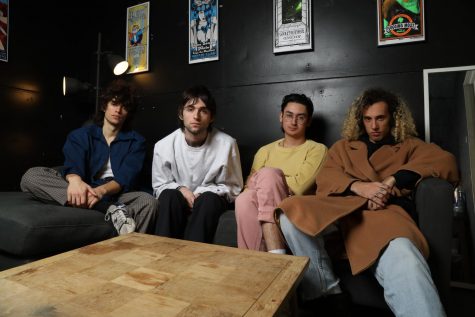
It’s October 22, 2021. After taking photos of the band during soundcheck with my dad, I find myself in a green room sitting across from Liily’s Dylan Nash and Sam De La Torre. It’s in a venue called The Basement in Columbus, Ohio. It may not be a unique name, but it’s accurate. It sure is a basement. Their debut album, TV or Not TV, had been released that day, and they were set to perform their first show since said release in a couple of hours.
The three of us were all a little bit confused. I was waiting for the other two members, Maxx Morando and Charlie Anastasis, only to be told by Dylan that he was under the impression it would just be the three of us, as typically only two of the members are interviewed at once. As soon as we get our misunderstandings sorted out, Maxx and Charlie are called in, and, after we all introduce ourselves, each picks a seat on either side of the couch.
Alright, well, I’m not really sure how to introduce this, so could you introduce yourself and describe your sound a little bit to anyone that doesn’t know?
M: We are Liily. I’m Maxx.
D: I’m Dylan.
S: I’m Sam.
C: I’m Charlie.
M: I don’t know if I can describe it, that’s for the people to describe, but if I had to pick… as a broad genre, I’d probably say rock, but if we’re being more specific, I would say post-punk. But also everything in between.
I found this band back in 2018 when I was maybe 12 because I was watching The Chilling Adventures of Sabrina, and there was like a five-second clip of one of your songs. I’m super into music like that, so I remember searching on Google to find all the songs in the episode, and somehow that ended up with me here now. I guess– and you’re still fairly not as well known as you should be right now, but you were a lot smaller back then. I’m guessing it would be a little jarring getting an email from the showrunner asking to be in the show, right?
M: I don’t really remember it happening.
C: I mean, yeah, it was d– I remember being excited that a song we’d done had a TV placement and that was great.
S: Usually they just let us know.
M: Yeah, they’re like, “this is happening.”
S: “This is happening,” it’s like, “oh, sweet.”
D: I guess that was when we were kind of starting up.
M: Yeah, that was, like, in the beginning. But it was– I mean, it’s awesome.
I read on NME that the lockdown sort of enhanced your writing process in a way; could you give a little more insight into that?
D: Well, yeah, I mean, we were forced to, essentially. We had to write a record, and the more time we had to ourselves kind of forced us into writing better, you know? The more you write, the better you’re going to get. As cliché as that is.
M: We were gearing up to go into the studio in March and we had a bunch of ideas from… a year built up? We went to Joshua Tree for a week to get them ready to go record and do pre-production, and then COVID happened, which, like he said, forced us to kinda, like, relook at the record and what songs we want to put on. Some songs that made it onto the new album were birthed out of quarantine and the restrictions of we couldn’t meet up. That’s how it kinda affected the writing process and gave us kind of a new look on how to make music, and different from how we normally made it. Going forward, now we just have more tools to make new stuff.
I know you originally wanted your album out at the beginning of this year with “Wash” as a single. What did you originally envision the first version of your debut to be like, and why did “Wash” get the boot?
D: Well, I don’t think we knew what we wanted, that was the issue. We kinda did, we had this broad image, but I think it took a lot of growing up and learning how to write a record to finally know what we wanted.
S: There was a lot of time between when “Wash” came out and when we made this album, so it actually wasn’t considered part of this album. It was, like, a completely different time in our lives; but it definitely was what we all think pretty well describes the middle ground between what we put out first and what’s out now.
D: Yeah, and, on top of that as well, when we went into the studio, we recorded two songs. We only had two songs written, and that was “Wash” and what is now “Man Listening to Disc.” We recorded that, it didn’t sound how we wanted it to, so eventually we just released “Wash.” We had this song and we hadn’t released music in a minute, so we just released that.
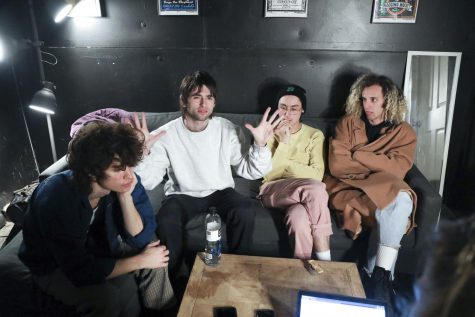
That actually answers another question I had. A lot of the songs on TV or Not TV are either more energetic, abrasive, more synth-heavy, or sort of a combination of the three. I also read on NME that you were influenced by bands such as black midi, Fugazi, and Daughters for your new sound. Why did you decide to go this direction after what was released on I Can Fool Anybody In This Town, and what were some of your other inspirations for such, whether they’re other bands, or anything else?
S: It wasn’t so much a decision to go for a different sound. It just ended up being where we were in our lives because it happened a lot. Like, there was a big space between writing all the songs when we grew up– some of those songs, some of them 15/16, and then all of the songs that are on TV or Not TV now is… 18/19/20 maybe? Is it 19/20? We didn’t write anything in 2018…
M: There’s probably some remnants in, like, “Red Sock,” which is known as “Miracle of Race Wild.” That was sitting around– we’ve had stuff lying around for a while, and then…
C: It’s all just a product of getting older.
S: Yeah, it’s just different people now.
C: As you will one day learn.
[The band laughs.]
C: I can’t believe you’re 15, dude.
S: Don’t patronize him.
C: No, no, no, it’s endearing, I’m not trying to condescend.
D: Just to finish the answer, I think that we would’ve done ourselves a disservice if we didn’t stray so far from the EP. Because it’s, like he was saying, six… five/six years since we wrote some of those songs, and, like, yeah, they’ve done a lot for us, but it’s just ultimately not who we are as adults and human beings now.
M: And we wrote ‘em when we were teenagers and then put ‘em out when we were 18, kinda? So we were already past that point in our lives, and this is kind of the product of the last two years/three years.
That kind of leads me into my next question. Your debut EP was written when you were around 15 or 16, why did you wait so long to complete it?
M: I think just circumstance. I think we kind of had them in the bag for a while, and then we signed to the label, and then we recorded them, and then it’s just what we had at the time.
C: But even in the signing, that’s like a two-year window right there. You have a song, and you’re playing it all the time, and then you get a label involved, and that’s a year… a year or two until the song is actually out.
D: It was a lot of pushing it off too, ‘cause we were talking about recording and stuff, and we kinda did, and kinda let it sit for a minute, so…
M: Like, most things just happen [from] circumstance.
D: It’ll happen when you’re 17 years old. Maybe not you, but…
You guys held a music festival in 2019 called Brekfest, is that an idea you’re ever going to go back to?
[The band agrees in unison.]
M: Well, ‘cause COVID kinda… we were kind of planning–
S: We just have ideas about it all the time. Like, we go to a cool place that’s out of state, or do a traveling Brekfest, or something like that. I think it’s fun meeting other bands and watching them play.
C: We also know a lot more bands now than we did before, so I think we can curate a little bit better.
S: It’d be cool to see all of those worlds in one tent anyways, so if we could do it and people show up, that’s cool, too.
M: So, hopefully, yeah.
In a 2019 interview at SXSW, Charlie said that being a band just happened and that it’ll probably end sometime, but it’s what you like doing now. If the band were to collapse, what kind of work would you go into, and, Dylan, would you go back to Jamba Juice?
[The band laughs.]
C: I hope he would. That’s crazy.
D: I mean, since you asked me first, uh–
C: He didn’t ask you first, he said would you–
[They laugh again.]
D: I would not go back to Jamba Juice. I felt that the health and safety… of the employees– no, I’m kidding. I… no, I wouldn’t.
C: We all still like doing this as of right now.
M: If we weren’t, we’d probably be doing the same thing. Making music, making art, making videos, writing stories, and everything in between.
S: Whatever it is, it’ll be a product of what’s happening right now anyways.
C: That’s a great question. You gave me anxiety when you said, “Charlie said this in 2019,” I was like, “ohhhh what did I say–”
M: We have some really brutal interviews when we didn’t know really how to answer questions that are out there and still floating around, so…
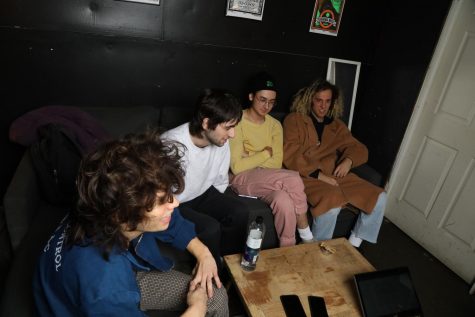
This album has been in the works for a while, clearly. Is there a specific song that you’ve been looking forward to playing live the most?
M: Hell yeah. “The Suit That Sold Itself” is probably, I think collectively a top-three… I think is one of our all-favorites. It’s one of the more abrasive ones, but I think the one we have the most fun playing. But, I mean, I really feel like every song on the record we’re hyped to play every night.
C: Because it’s nice to play a new set.
M: Yeah. Like we said with the making of the EP and stuff, we’ve been playing these songs– the old songs– for so long. There was one tour that we did in 2019– bro, we literally were playing unfinished songs because we were trying to play something else. So it’s nice to play the new stuff and then also have the old stuff to be like, “okay, the old stuff isn’t as annoying to play now that we have new stuff.”
I know it’s very early, since today is the day of your debut album’s release– congratulations, by the way– are there already any plans for new music, or any ideas circulating for what’s next in the band’s future?
M: Definitely ideas. We have a tour– we have to finish this one, and then we have a little break for five days, and then we go to the UK, and then when we’re back home… we’ve been playing a lot with electronic stuff, not that that’s what it’s going to be, but we’ve been floating a lot of ideas, and we’re going to go back to writing more now. We’ve been working on this album for so long, now it’s like, “okay, we did it, now we gotta do the next thing,” and it’s a little bit anxiety-inducing, but also exciting at the same time. Just consistently trying to get better at being more proactive and writing and keeping the train rolling.
Thank you to the band, The Basement, the PR people at Tell All Your Friends, and everyone else that was able to make this interview possible.
Liily’s debut album, TV or Not TV, is out now on Flush Records. Listen to it here.

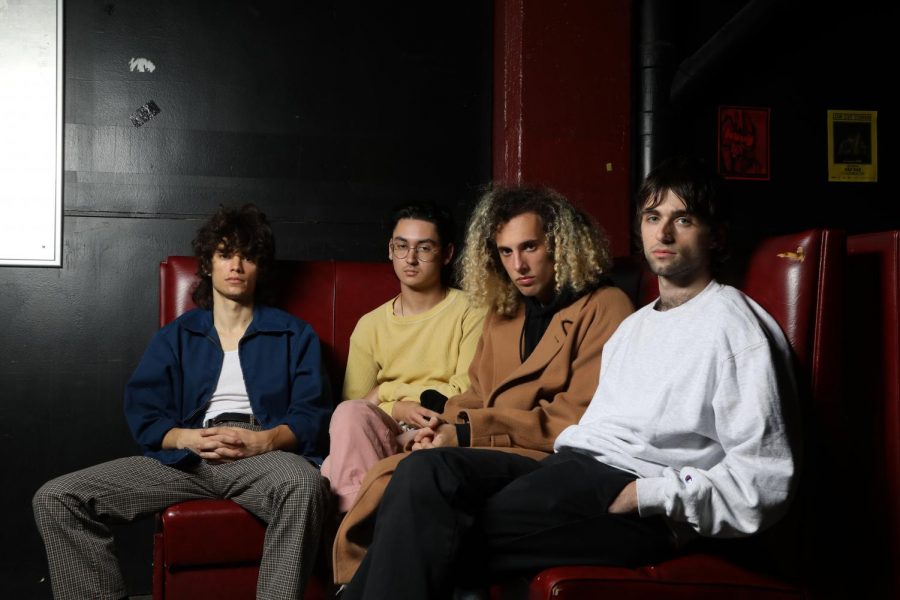
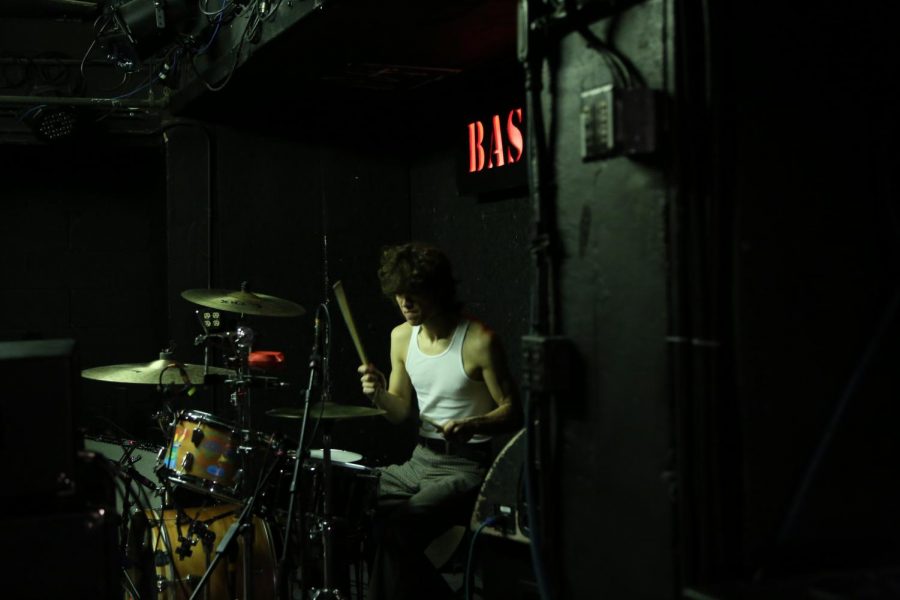
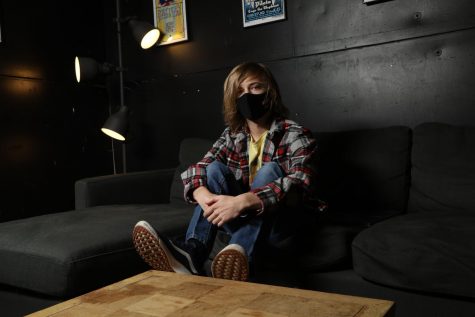
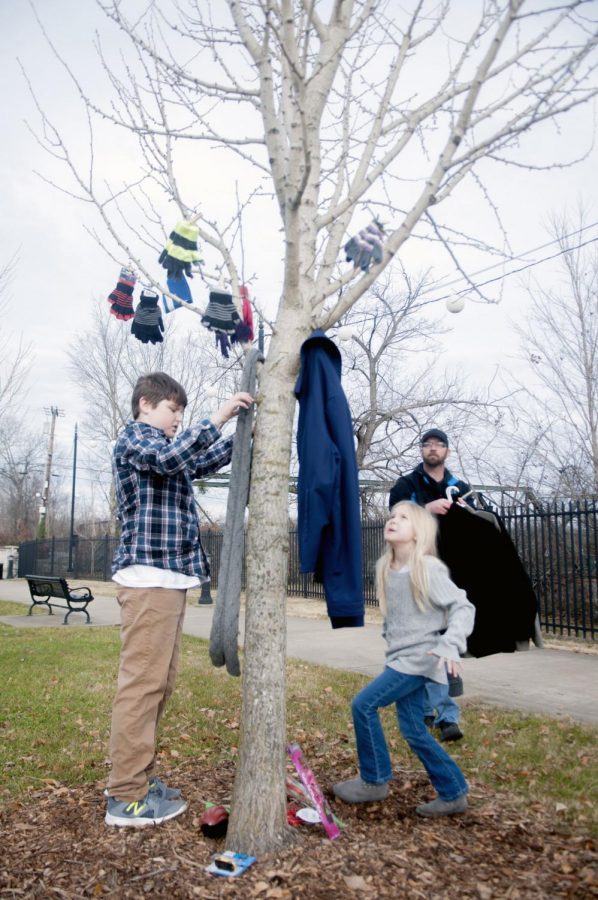
brooklynn bostick • Nov 17, 2021 at 1:19 pm
Amazing piece! And amazing description of the “Early Bopper” music vid.
Duke • Nov 15, 2021 at 2:14 am
Great interview- and yea Sam is undeniably creative. He’s genius.
Tab • Nov 13, 2021 at 2:59 am
Love this! A thoughtful and beautifully penned story with nice twists and turns. Happy you and your dad took that long drive. Keep writing ? … and listening to Liily.